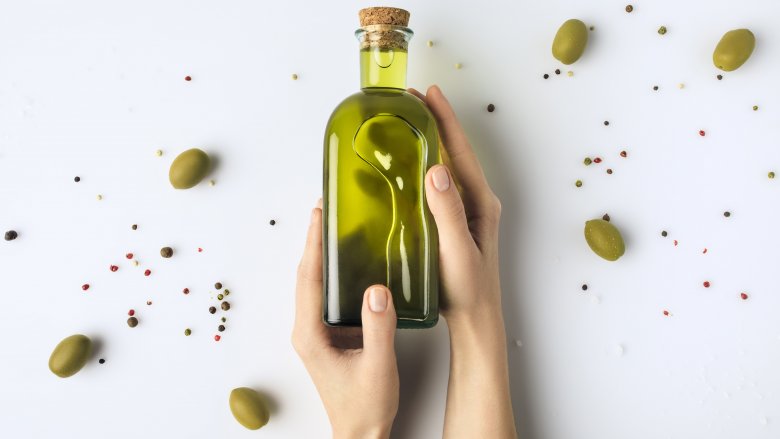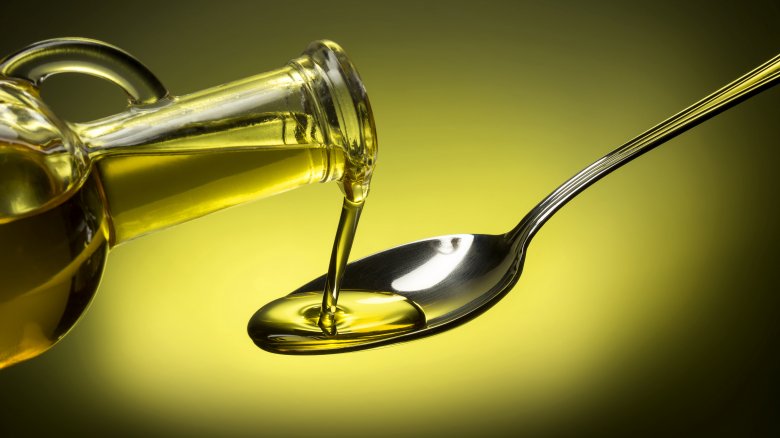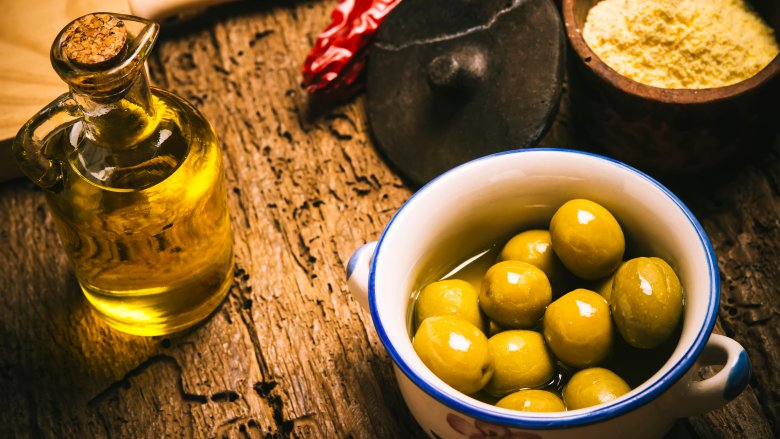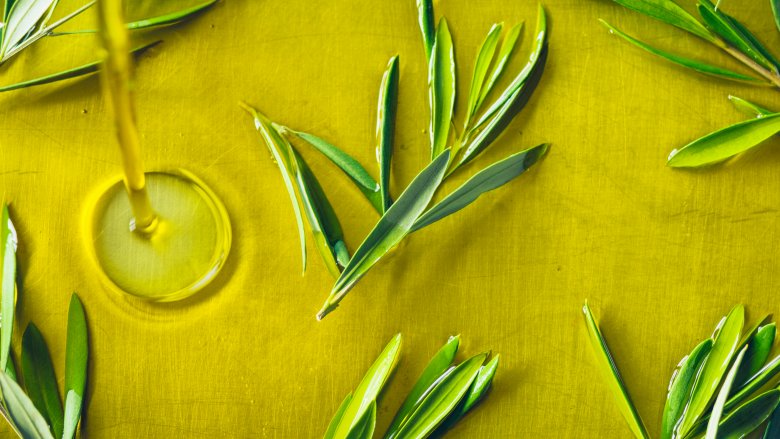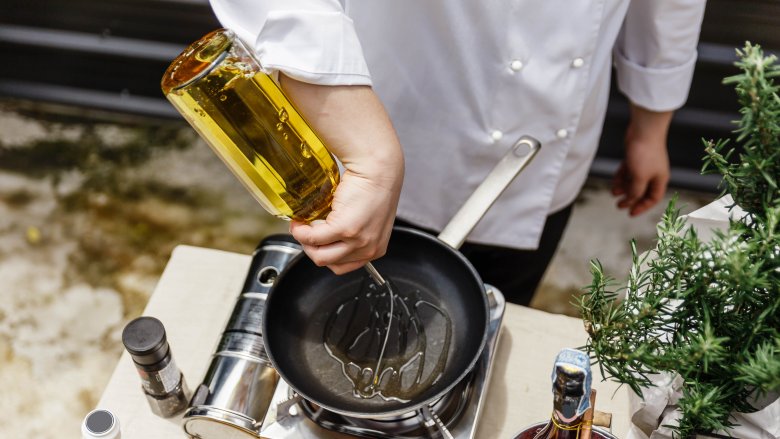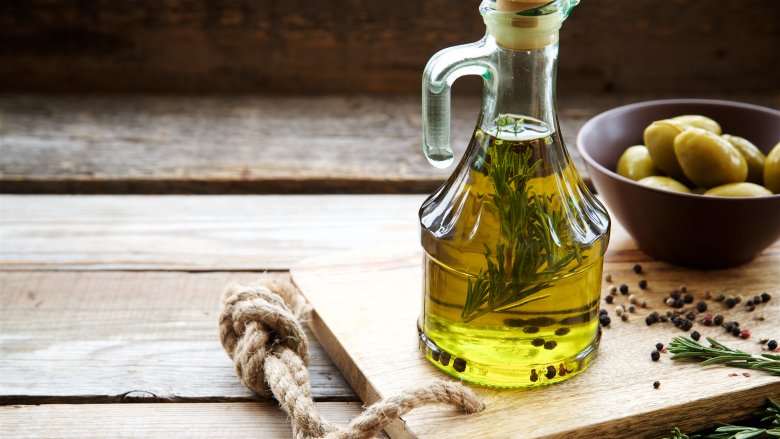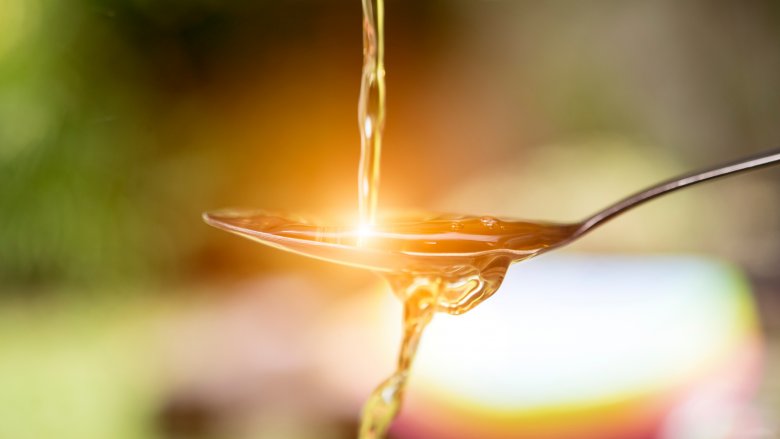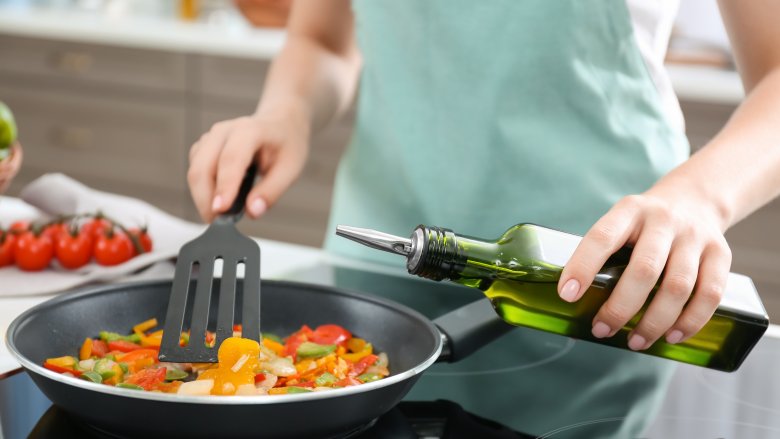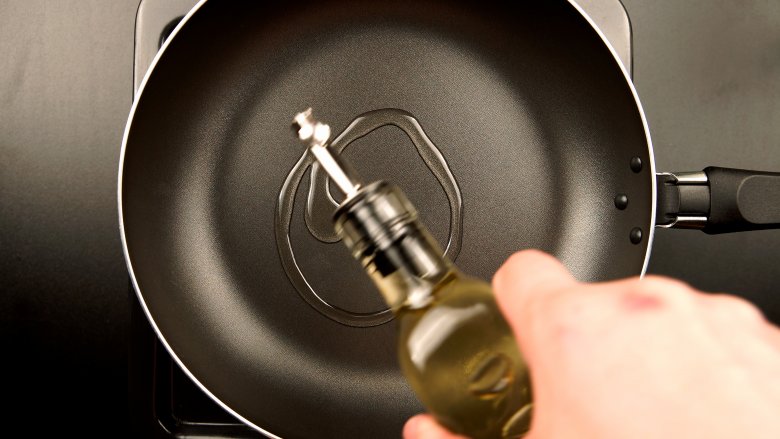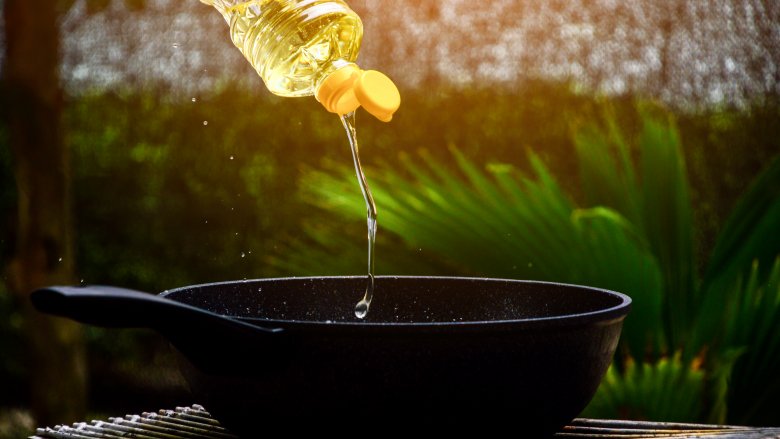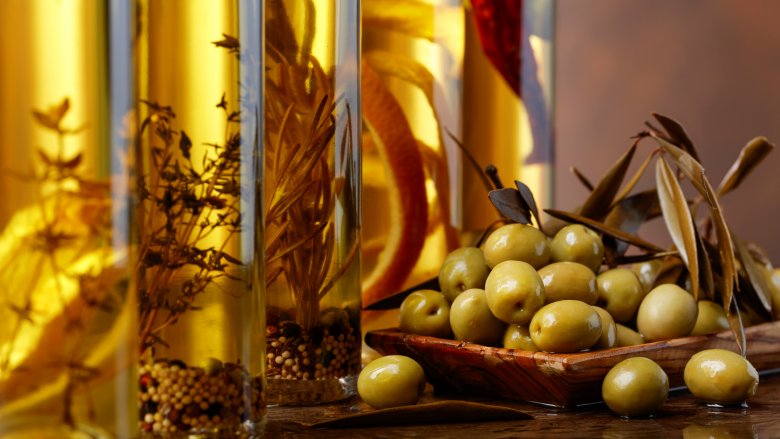You've Been Cooking With Olive Oil All Wrong
When it comes to cooking oil, there are a ton of options out there. There are bad, good, better, and best uses for every kind, and olive oil is no exception. While it's great for drizzling on cold dishes and making things like salad dressing, it's actually great for cooking with, too.
And that's a good thing. Heathline says there are a ton of proven benefits that olive oil brings to the table, and scientific studies have backed up the benefits of adding olive oil's healthy fats to your diet. It's also full of antioxidants (those are the things that help you fight disease), and it's an anti-inflammatory that can help reduce your chances of developing conditions like arthritis. It's even been linked to lowering the risk of heart disease, type 2 diabetes, and stroke.
That's a lot of goodness in one little package, but you'll need to use it the right way to get the most out of that bottle of olive oil you keep sitting by the stove. Speaking of keeping it by the stove... you shouldn't be doing that. Let's talk about that, along with a lot of other things you shouldn't be doing with olive oil.
You keep it close
Setting up your kitchen right can be a challenge, especially if you're working with limited space. The temptation to keep things you use all the time — like olive oil — close at hand is great, but according to Good Housekeeping, keeping that bottle next to the stove is exposing it to elements that will change everything about that olive flavor you love.
When olive oil is exposed to light, heat, and oxygen, it'll start to change. It'll become mustier, and eventually it will even start to develop a taste not unlike vinegar. It might be easy to grab when you keep it next to the stove, but which is more valuable, taste and quality or just a bit of convenience?
The best way to keep your olive oil is to store it in a dark place away from light, heat, and fluctuating temperatures. That's about the exact opposite of the conditions it's exposed to when it's next to your stove.
You always reach for the EVOO
The olive oil that gets the most attention is the extra virgin stuff, but that's not the only kind that's out there. EVOO might not even be the best for the job, either, and according to Prevention, other types of olive oil might be better suited to what's on the menu any given night.
Extra virgin is the strongest type of olive oil there is, since it comes from the first pressing of the olives. That makes it best for cold dishes where there's nothing to overpower that distinctive flavor. Use it for things like dips and garnishes, but when it comes to cooking, you might want to reach for different bottles.
Virgin olive oil comes from the second pressing of olives. It's a bit more mild than EVOO, and it's the stuff you should use when you're pan-frying something and need a little bit of oil. Pure is similar to virgin as it also comes from the second pressing or it may be chemically extracted, and since it doesn't have that strong flavor of EVOO, it's actually pretty great for baking and roasting.
You're deep-frying with it
Here's the thing — good olive oil can be expensive, and that means it's easy to use it in a way that's not maximizing potential. One of the biggest, baddest wastes of olive oil is deep frying.
The logic seems sound. Fried foods are delicious and they aren't good for you, so switching the oil out for olive oil might seem like a great way to get the best of both worlds. According to research done by the American Chemical Society, olive oil is pretty stable as long as you're deep frying at temperatures between 320 and 374.
But, there's a catch. Olive oil isn't on the USDA's list of "safe" oils for deep frying, because temperatures regularly go above that 374 degree mark. Plus, Bon Appetit notes that you'll need cups and cups of the stuff if you're planning on doing any serious deep frying, and that's going to be super expensive — the biggest reason why you shouldn't do it. Go ahead and sear some meat with a dash of EVOO, but if you want to be budget-conscious, there's just no reason to go overboard with it.
You're not pan-frying with it
Sure, you might not want to deep fry with olive oil because you may as well just light some money on fire, but conventional wisdom and rumors aside, you can absolutely pan-fry with it. Serious Eats took a close look at whether or not olive oil is suitable for pan-frying some veggies or searing a nice piece of steak, and found that you should definitely go ahead and do it.
When you're pan-frying at temperatures that stay between 320 and 374, research from the American Chemical Society found that olive oil is actually more stable than other type of commonly used oils, like soybean and corn. That's a good thing!
As long as you're keeping an eye on the temperature, olive oil's low smoke point and stability makes it pretty perfect for pan-frying and searing. For dishes that you want cooked through then browned, keep your temperature at around 300, then finish it off by cranking the temp to 350. That's going to allow for complete cooking, then you'll be adding a crispy brown finish in the last few minutes as you approach olive oil's smoke point.
You're not accounting for the flavor
When Serious Eats whipped up a series of dishes using both olive oil and canola oil, they found that while both oils performed well technically, there was a definite taste difference you'll want to be aware of in some dishes.
For more delicate dishes, olive oil can overpower a bit of the natural flavor of the dishes' ingredients. Sometimes, that's not a bad thing. You might want to add that distinctive, olive oil flavor to some things, particularly if you're whipping up a delicate dish of fresh veggies or a Mediterranean-inspired meal. But there are times you might want the ingredients to stand completely on their own, like when you're making light pan sauces. If that's the case, you'll want to reach for something other than olive oil.
Still, some dishes aren't going to be impacted either way. Think of pan-seared meats in a heavy sauce. That sauce and the seasonings will mask any flavors imparted by the olive oil, so it's not as big a deal. Before you start, then, ask yourself two questions: will the flavor of the oil come through the dish, and do you want the flavor to be changed by it?
Going heavy because it's "light"
Every cook has been guilty of this. Just because something is labeled as light, it's easy to give yourself a bit of leeway to get heavy-handed with it. But if you find yourself adding more "light" olive oil to a dish because you're thinking it's lower in fat and calories, you should know that's not the case.
Cooks Illustrated says that "light" in this case refers to the oil's more mild flavor, not the amount of fat and calories. It's not necessarily healthier than other olive oils, but it definitely doesn't have that distinctive EVOO flavor.
And here's where you can go wrong. Say you're using olive oil for a dip. You're trying to be health-conscious, so you pick up the light stuff and think you're doing something responsible. You're not — you're getting the same fat and calories with none of the flavor you're looking for. That's not to say light olive oil doesn't have a place in the kitchen, because it does. When you're baking, use this kind to make sure you're not making your cakes reminiscent of the olive bar at your favorite grocery store.
You're not watching the temperature
Every oil has a particular smoke point, and when we say that, we're literally talking about the temperature where it's heated to the point where it starts to smoke. Sometimes, you might want it to do this — like when you're searing a steak. A charred flavor is desired in that case, but it's not always wanted. If you don't want that smoky flavor in your food, you have to be careful to keep you oil below its smoking point.
Each type of olive oil — extra virgin, virgin, pure, and light — has a different smoke point, and here's the thing: sources can't agree on what it is. Prevention and Healthline, for example, say the smoke point of extra virgin olive oil is somewhere between 375 and 405, while the North American Olive Oil Association gives a wider range of between 350 and 410. While that will give you a ballpark figure, here's the really important part.
They all agree that extra virgin olive oil has a lower smoke point than other types of olive oil. Light olive oil doesn't hit a smoke point until somewhere around 470, and that's important. Depending on what type you're using, you'll need to keep an eye on what temperature you're cooking at. While these oils aren't going to hurt you, they will start to change their flavor and potentially lose nutrients if they're heated above their smoke point. You'll have to decide if that's good or bad.
You're ruining your nonstick pans
Caring for your pots and pans can be a tricky, daunting task, so let's talk about one thing that you might not know — olive oil can ruin some of your cookware.
Swiss Diamond makes nonstick cookware, and one of the biggest mistakes they say you're making with your nonstick pans is that you're putting them over a high temperature and using olive oil.
Take a minute to let that sink in, because it's pretty strange. It all has to do with what happens to olive oil when it hits that oh-so-important smoke point. When it starts to smoke, it's also starting to carbonize. When it does, it's forming that gunky, dark, nasty buildup you're probably familiar with. It's super hard to remove even from nonstick pans, and scrubbing it is going to do a number on your nonstick pans' surface, too. They say that while you can use olive oil with those nonstick pans, you should be extra careful not to use anything but a low heat. It'll save you some serious headaches when it comes time to clean up, and it'll save your pans, too.
Using it instead of better options
Sure, there are a ton of health benefits to olive oil, but it's not always the best option for the job. Sometimes, you'll want to reach for other oils, and here's some scenarios.
Take baking, for example. BBC Good Food says sunflower oil is one of the best options for baking, because not only does it have a mild flavor that's not going to change the taste of your baked goods, but it'll also keep your goodies moist for up to five days. Grape seed oil has a super high smoke point, and Foodal says it's great for deep frying. Then, there's rapeseed, which The Telegraph says not only comes with health benefits that rival those found in olive oil, but it has a higher smoke point and a buttery, nutty flavor that can impart a completely different taste to some dishes where you might not want to risk the flavor of olive oil seeping through.
Picking the right oil for the job can be difficult, but don't make olive oil your one go-to oil for everything, and don't be afraid to experiment.
The rumors you shouldn't be cooking with it at all
And now, let's talk about the elephant in the room: the long-standing belief that you shouldn't be cooking with olive oil at all. The belief is that when olive oil is exposed to high heat, it'll break down and form bad fats and harmful compounds. According to Heathline, scientific studies have found that olive oil — in spite of a low smoke point — is still relatively stable when it comes to breaking down into other components and losing nutrients.
Most of the fatty acids in olive oil are the monounsaturated kind — 87 percent, to be precise. Those aren't just the good kinds of fat, they're also the fats that stand up well when exposed to heat.
The other problem that's often repeated about olive oil is a tendency to form harmful and even carcinogenic compounds, but that's just not true. Olive oil is highly resistant to the process that forms these compounds, which is called oxidation. It's been found to be stable even at high temperatures, and even though high temperatures might result in the loss of some antioxidants and vitamin E, it's not as harmful as it's sometimes thought to be. So go ahead — use olive oil when you're cooking, and enjoy.
